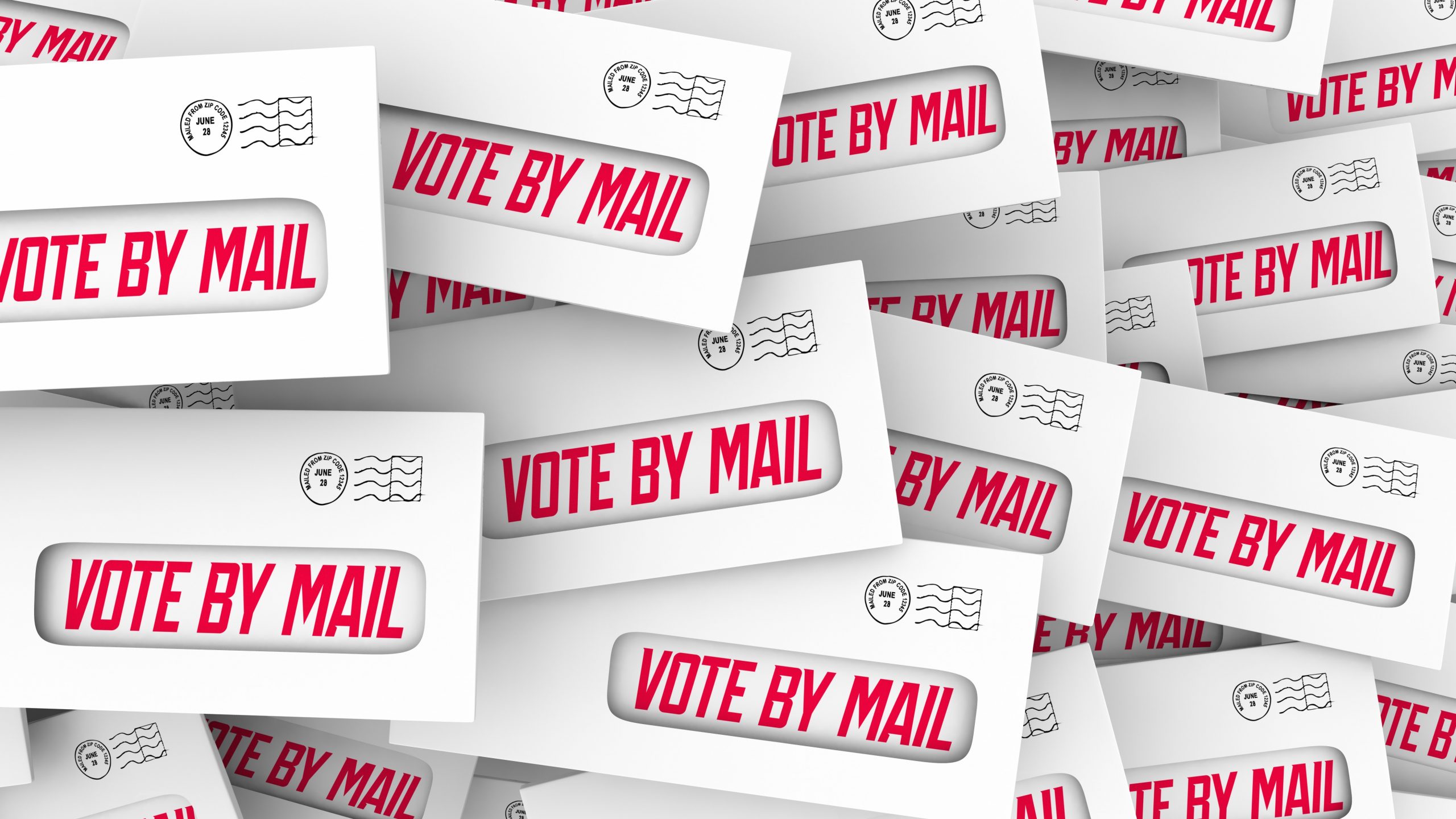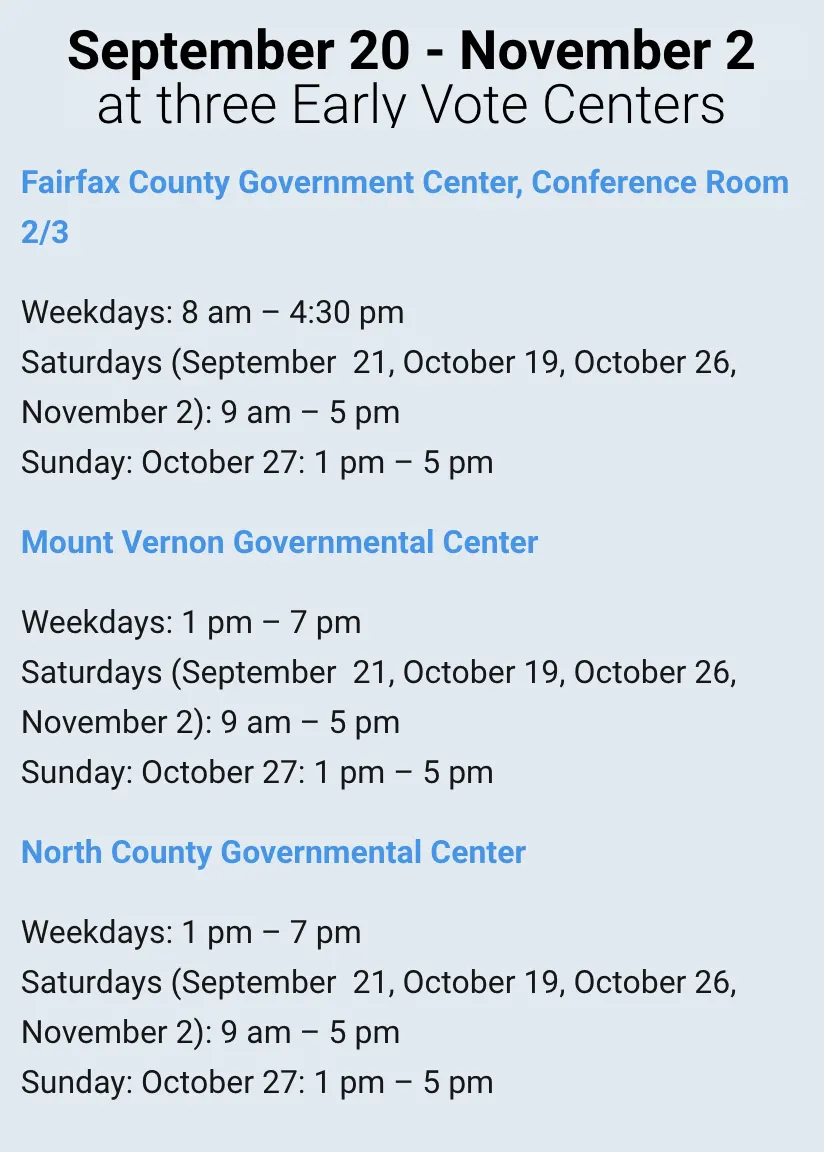
Election Integrity Working Group | Fairfax GOP
The former General Registrar of the Fairfax County Office of Elections and the Fairfax Electoral Board did not obtain legally required oaths that attest to the proper printing and delivery of the ballots for the 2021 election, until months after that election occurred. Some oaths required by law may not have been obtained at all for 2021 or earlier elections. These oaths, required from the printer and from the Electoral Board representatives overseeing the printer, are important parts of the Chain of Custody documentation for ballots in every election.
Here’s the background. A huge surge in absentee ballot requests occurred in 2020, accounting for almost 60% of all ballots voted. Local election offices struggled to do the massive mailings in-house to send absentee ballots out to voters. Anticipating similar rates of mail-in ballot requests for the 2021 General Election, the Virginia legislature passed a law in March 2021 permitting Election Offices to contract with third parties to mail out absentee ballots. Potential conflicts between the new law and existing laws governing the printing of ballots apparently were not examined or resolved at that time.
A month later in mid-April, Scott Konopasek was hired as the General Registrar in Fairfax County. For many years prior to being hired by Fairfax County, Konopasek had contracted with K&H Printing, located in the state of Washington, to print and mail out absentee ballots for other states. On August 26, 2021 Konopasek announced at the monthly Electoral Board meeting that Fairfax would hire K&H to print all Fairfax ballots for the 2021 General Election and to mail out all absentee ballots.
Most states have laws or regulations governing the printing of ballots. To have confidence in the integrity of our elections, we need to be confident that the company printing the ballots will print only the numbers of ballots that were ordered and will ship those ballots to the Election Office for distribution to the polling places. Virginia has passed several laws, specifically sections 24.2-612, 24.2-616, 24.2-617, 24.2-618 and 24.2-619 in the Virginia Code, to protect the integrity of printing and distribution of ballots. Those laws are administered by having the printer sign three oath documents and by having the Electoral Board or its representative sign two additional oath documents swearing that they have observed the whole ballot printing process.
In 2021 in Fairfax County, we discovered that those documents were not signed and submitted when they should have been. On February 4, 2022, a volunteer with the Fairfax GOP Election Integrity Working Group submitted a Freedom of Information Request to Fairfax County for documents related to the K&H contracts. Among the documents that were provided in response to the FOIA request were three sworn statements that should have been submitted by K&H prior to the November election. All three were signed by David Haines, a Senior Vice President at K&H printing.
All three forms state at the bottom of the page that the forms also must be filed with the Secretary of the Electoral Board and retained in the records and minutes of the Board. We have sent a separate FOIA request for any documentation showing that the oaths were in fact filed with the Secretary of the Electoral Board, Kate Hanley, and that they were retained in the Board’s records.
The problems with the three sworn printer statements were the signature dates. The tasks specified in the forms were all to be performed and affirmed before the 2021 General Election. However, two statements were dated February 4, 2022, the same day the Office of Elections was sent our FOIA request. The third statement was dated February 7, 2022. All statements had been signed a full three months after the election and almost five months after the start of early voting. The three statements included:
Several long-standing laws create the framework for the printer’s oaths; in addition to those laws, on July 1, 2021, the new law came into effect permitting the Election Office to outsource the mailing of the absentee ballots to a third party. However, the legislature did not address the operational conflict with the earlier laws, putting any Election Office that outsources mailing in a position where they could be violating the earlier laws. The policy contradictions between these laws appear still to be unresolved, particularly for the laws requiring a member of the electoral board to be present at the printing:
K&H Printing and the Fairfax Office of Elections were apparently aware of K&H’s obligation to submit the oaths. The 2021 K&H Printing Statement of Work makes a point of mentioning K&H’s obligation, stating in clause 18, “Contractor agrees to provide the County all certifications and documentation required by Virginia Election Code (§24.2-613 et seq.) and pertinent regulations.” According to Fairfax County Office of Election’s statistics, 82,239 voters requested absentee ballots in 2021. Those ballots would have been prepared and mailed out by K&H.
Two other 2021 Election ballot forms have been requested from the Office of Elections and Electoral Board, but not yet provided. These are forms showing that a representative of the Electoral Board was present during the printing of the ballots. A FOIA request has been submitted for the two forms, as well as for related email correspondence and other documents. Like the three printer’s oaths, these two forms also state that they must be filed with the Secretary of the Electoral Board and retained in the records and minutes of the Board. These are the two other forms:
The situation raises several questions about the conduct of elections in Fairfax and in Virginia:
POLICY CONFLICTS? Can the new Commissioner of ELECT or the legislature resolve the apparent policy conflict between, on the one hand, remote printing and mailing of the ballots (permitted by 24.2-706) even as far away as the state of Washington, and on the other hand, requiring someone from the Election Office to be present during the printing (required by 24.2-617 and 24.2-619)? One suggested solution would permit the County Election Office to appoint the printer or an employee of the printer as the Electoral Board’s representative to observe that same printer’s operations and ensure his compliance with the law. This presents an obvious conflict of interest, with the printer providing his own oversight in the absence of an independent representative of the Electoral Board, and it seems the opposite of the intent of the Electoral Board’s oversight mission defined by law.
ARCHAIC LAWS? How can the legislature or ELECT update the law requiring the printer to affix a seal on each ballot, witnessed by a representative of the Electoral Board? The law is generally thought to be out of date, as a seal may now be printed on all the ballots but not typically stamped or embossed on each ballot.
WIDESPREAD PROBLEM? How common is this failure to obtain the signed printer’s oaths and the statements of the Electoral Board representatives in a timely manner (or ever)? Is the problem of oath documents signed months after an election unique to Fairfax, or is it state-wide?
RISK TRADE-OFFS? What are the risk trade-offs between outsourcing the mailing of the ballots or conducting that mailing by hiring temporary workers to do the mailing in-house? In 2020, Fairfax did the absentee ballot mailing in-house with some 300 temporary workers, paying some of them from a $1,431,950 grant provided to Fairfax by the Mark Zuckerberg-funded Center for Tech and Civic Life. Other workers were temporarily detailed from government agencies across the County. Doing the job in-house created its own set of errors, when duplicate ballots were sent to an unknown number of voters, with estimates reported in the media ranging from 400 to over 1,000 duplicate mailed ballots. Outsourcing the absentee ballot mailing presents administrative and oversight risks; doing the mailing in-house presents additional operational risks, especially in large counties. There’s no risk-free option, especially given the current election laws.
WHAT IS TO BE DONE? Different solutions have been offered. The new Fairfax General Registrar, Eric Spicer, announced at the April 14 Electoral Board meeting that printing of polling place ballots would be done by PrintElect, a company located in North Carolina, and the absentee ballot printing and mailing would still be done by K&H for the 2022 election. Even if the printers submit their oaths in a timely manner, the required presence of an Electoral Board representative during the printing remains an open issue. Other county Election Offices are considering keeping all absentee ballot mailings in-house to avoid the risk of third parties handling ballots.
Stay tuned. Reportedly Delegate Dave LaRock has requested an investigation by Fairfax Commonwealth Attorney Steve Descano of the K&H oath omissions. We will provide updates as soon as Fairfax County responds with the documents requested in the Freedom of Information Request.
The Election Integrity Working Group is a volunteer-led project of the Fairfax County Republican Committee.


